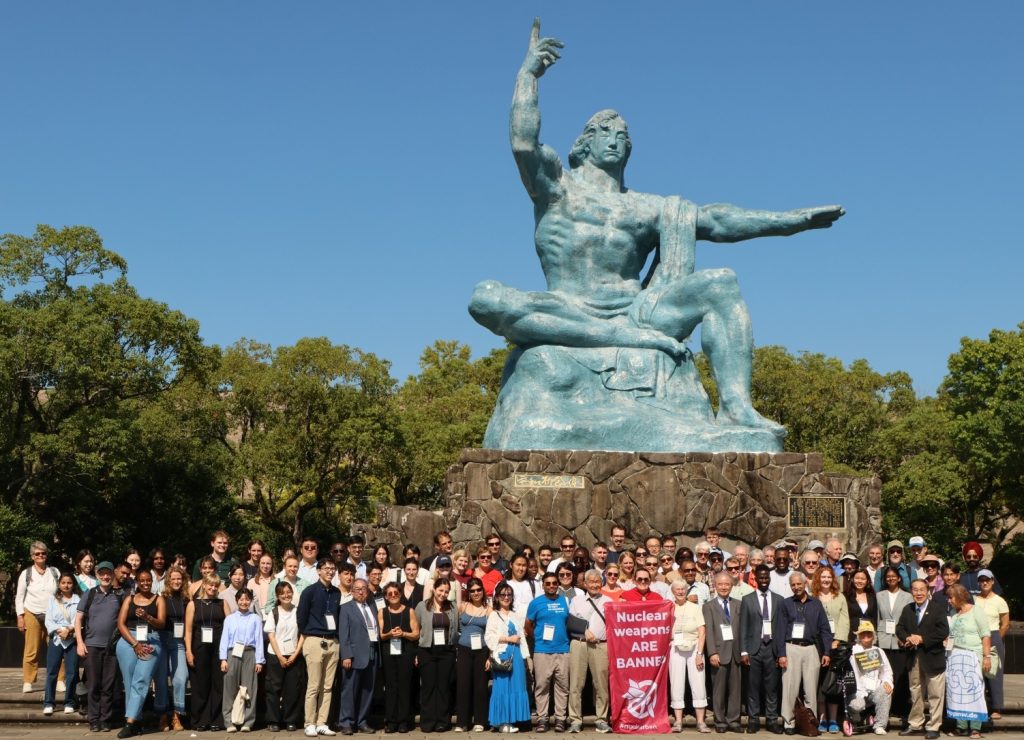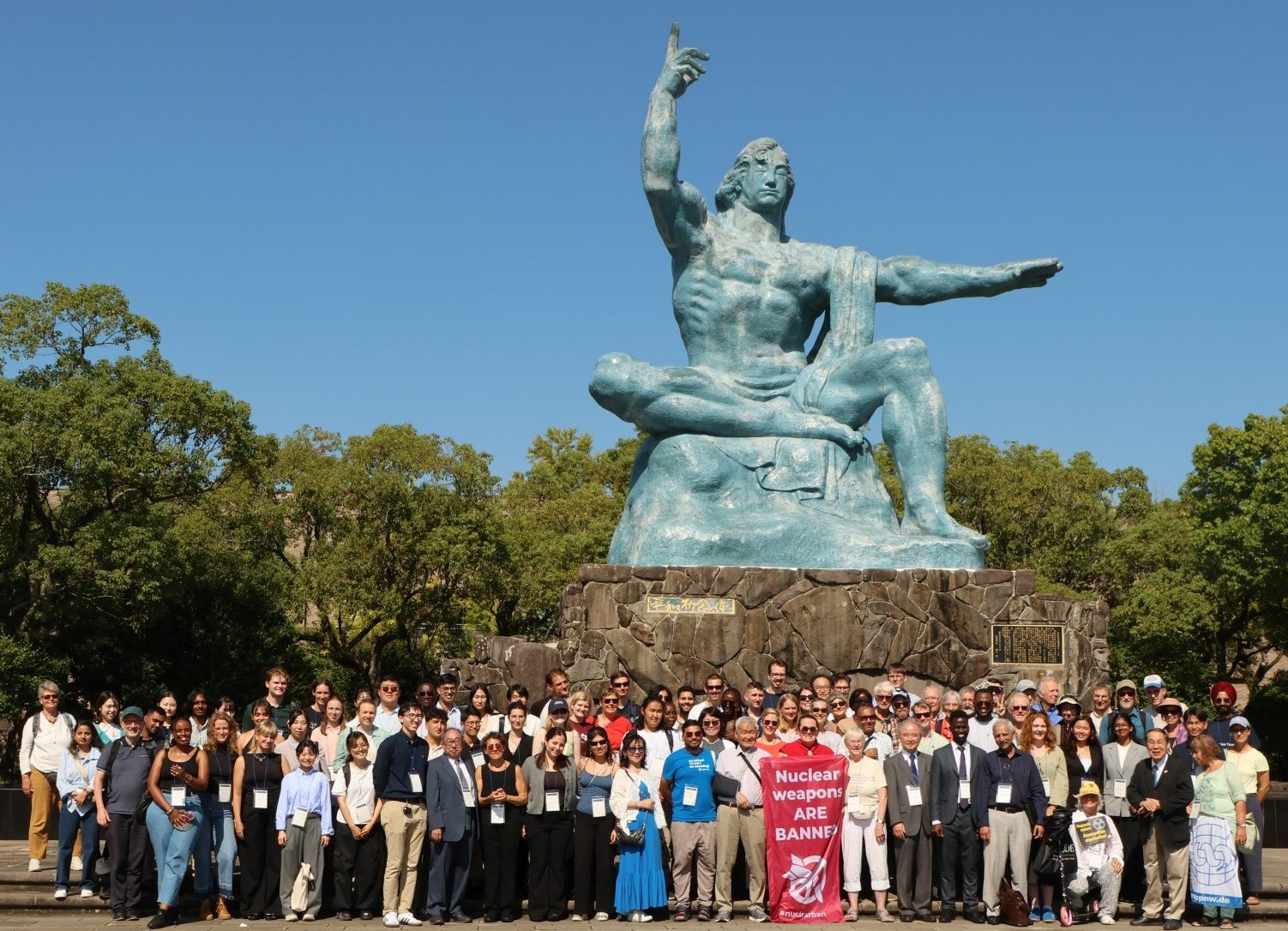
We have gathered in Nagasaki, as doctors, medical students, and activists, to commemorate the Hibakusha, the victims and survivors of the US atomic bombings here and in Hiroshima 80 years after those terrible events, and the survivors of the more than 2,000 nuclear tests conducted around the world. We recognize and thank the Hibakusha and Nihon Hidankyo, recipients of the 2024 Nobel Peace Prize, for their life-long dedication to the abolition of nuclear weapons. We are honored by their presence at this Congress. With their example before us, we recommit ourselves to achieving a world free from nuclear weapons.
When IPPNW last met in Japan—in 2012 in Hiroshima—the International Campaign to Abolish Nuclear Weapons (ICAN), founded by IPPNW together with our Australian affiliate, the Medical Association for Prevention of War, had been launched five years earlier. The push for a treaty banning nuclear weapons, led by ICAN, was just getting under way. The medical, environmental and humanitarian evidence about the catastrophic consequences of nuclear war, in the face of continuing failure to progress long-promised disarmament, was so compelling and so irrefutable that the Treaty on the Prohibition of Nuclear Weapons (TPNW) was negotiated and adopted in a mere five years, and now has 95 signatories and 74 States Parties (including four that acceded to it without signing first). Thus a total of 99 countries—a global majority—have now taken legal action to join the treaty. With three successful meetings to its credit, and a review conference planned for 2026, the Treaty has established itself as the one clear path to a nuclear-weapons-free world.
We applaud the positive steps being taken by the UN General Assembly and World Health Organization to prepare comprehensive, 21st century reports on the health, humanitarian and environmental impacts of nuclear war. The emerging work of WHO would not have happened without active collaboration between IPPNW and major health organizations, including the World Medical Association, International Council of Nurses, and World Federation of Public Health Associations. We are grateful that these global health leaders have made the elimination of nuclear weapons a priority for their work.
Regrettably, however, the nuclear-armed states have all not only failed to embrace the promise of the TPNW, they have taken the opposite course: abrogating hard-won treaties constraining nuclear weapons, embarking on a reckless global arms race; threatening the use of nuclear weapons in a growing number of wars in the Middle East, Europe, and Asia; and all but abandoning arms control and disarmament efforts. As ICAN has reported, global spending on nuclear weapons surged to $100 billion in 2024, an all-time high that increases every year. Threats to use nuclear weapons, both veiled and explicit, have been made by leaders in Russia, the US, and NATO during the Russia-Ukraine armed conflict. Similar inflammatory rhetoric is now commonly heard during periods of increased tension between India and Pakistan, and between North Korea and its neighbors. Earlier this year, Israel and the US bombed nuclear facilities in Iran, while new construction is underway at Israel’s Dimona nuclear weapons production site, further exacerbating regional instability and increasing the likelihood of nuclear weapons proliferation. Despite the fact that a growing number of countries are publicly floating the possibility of acquiring nuclear weapons, every meeting of the Nuclear Non-Proliferation Treaty since 2010 has ended in failure. The institutions of diplomacy and international law are being degraded, supplanted by aggressive authoritarianism and transactional politics. New START, the last remaining nuclear weapons treaty between the US and Russia, is set to expire in February 2026. The US should immediately accept Russia’s offer to extend the treaty’s limits for a year, and both should urgently undertake negotiations for disarmament.
We call upon all of the nuclear-armed states to halt the dangerous expansion of their arsenals, as well as their preparations for nuclear war under the guise of deterrence. They should finally act on the catastrophic humanitarian consequences of nuclear war and their legal and moral responsibility to eliminate the only weapons capable of eliminating humanity. We urge them to engage with the Member States of the TPNW with an eye toward joining the Treaty themselves and undertaking and completing a systematic, verifiable nuclear disarmament process.
We cannot ignore the devastating impact of war in the 21st century. The vast majority of the casualties today are women and children, and include health and humanitarian aid workers, teachers, and journalists. Millions of people have been forced to flee their homes, experienced horrific human rights abuses, and faced widespread hunger and famine. The already devastating wars in Ukraine and Gaza involving nuclear-armed states raises the specter of wider regional wars and threat of nuclear escalation. We reiterate our calls for an immediate cessation of hostilities in both wars, and for all possible efforts at dialogue to prevent further loss of life. We also call on the global community to work for the immediate end to the ongoing wars in Tigray, Darfur, Sudan, South Sudan, the Congo, and other areas ravaged by war. And, in all of these wars, we call for all necessary steps to ensure the protection of healthcare workers and facilities, and the removal of all obstacles to desperately needed humanitarian aid, paving the way for an enduring peace consistent with international law. The health, security, and fundamental human rights of all people in war zones around the world must be guaranteed.
We feel obliged, as we meet in Japan, to call attention to the continuing public health and security problems and needs in the aftermath of the Fukushima Daichi nuclear power plant disaster. The Fukushima nuclear disaster caused large and continuing releases of radioactivity into the air, land, waters and marine environment and accumulation of large volumes of contaminated soil and water. Minimising avoidable radiation exposure to people inside and outside Japan, including generations to come, is a high and continuing public health priority. While acknowledging the difficulties of managing contaminated areas, we remain concerned that Japanese authorities raised and still have not reduced again the thresholds for radiation exposure for the public, have pressed displaced residents to return to reopened exclusion zones that remain highly contaminated, and are not adequately addressing ongoing health needs and the critically dangerous conditions that persist at the reactor site. The notion that the lessons of Fukushima and Chernobyl have been learned and that such disasters will not be repeated is worse than wishful thinking. The problem is compounded by the targeting of nuclear power plants and other nuclear facilities during armed wars, as we have seen in Ukraine and Iran. Nuclear power plants, spent fuel ponds and other nuclear facilities, including the many in Japan and elsewhere in northeast Asia, are vulnerable to both direct attack and disruption of power supply and cooling water, as occurred in Fukushima. A rapid transition to renewable, non-nuclear energy production is necessary to stave off the worst impacts of the climate crisis, prevent the next nuclear reactor disaster, and address the risk of nuclear proliferation.
Seemingly intractable wars, massive increases in global military spending, including on nuclear weapons, the rapid and unregulated development of artificial intelligence and its potential application to nuclear command and control systems, and the disturbing trend toward authoritarianism, especially in countries that were once democracies, have all made it more difficult to cooperatively address the twin existential threats of nuclear war and the climate crisis. If there is ground for hope in these fraught circumstances, we find it in the resurgence of IPPNW’s student movement and the youth-driven campaigning of ICAN. IPPNW student leaders are effectively breaking down the silos among these issues, representing the federation not only at key TPNW and NPT meetings, but also at the COP29 and other climate conferences. They are effectively delivering the message that the abolition of nuclear weapons, protecting the climate, ending war, and advocating for global justice and human rights, are all vital for our health and survival. IPPNW leaders from the current and previous generations are proud to be passing the torch to them.
The US atomic bombings of Hiroshima and Nagasaki 80 years ago exposed the fragility of our world in the nuclear era. The taboo on the use of nuclear weapons since 1945 is now itself eroding. We echo the words of UN Secretary General Antonio Guterres, “Humanity is just one misunderstanding, one miscalculation away from nuclear annihilation.” As physicians, we understand that we must prevent what we cannot cure, and nuclear war is a catastrophe from which there will be no recovery. We join our voices with those of the Hibakusha here in Nagasaki in calling for action for a more peaceful world and the prevention of nuclear war as an absolute imperative requiring the elimination of nuclear weapons.

